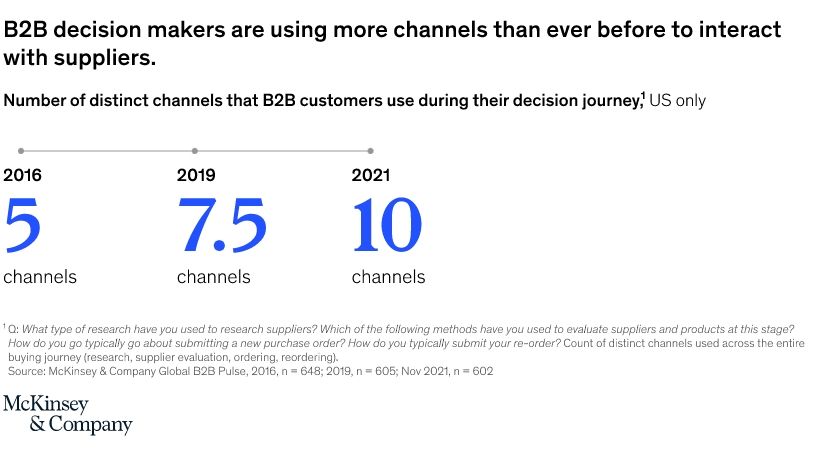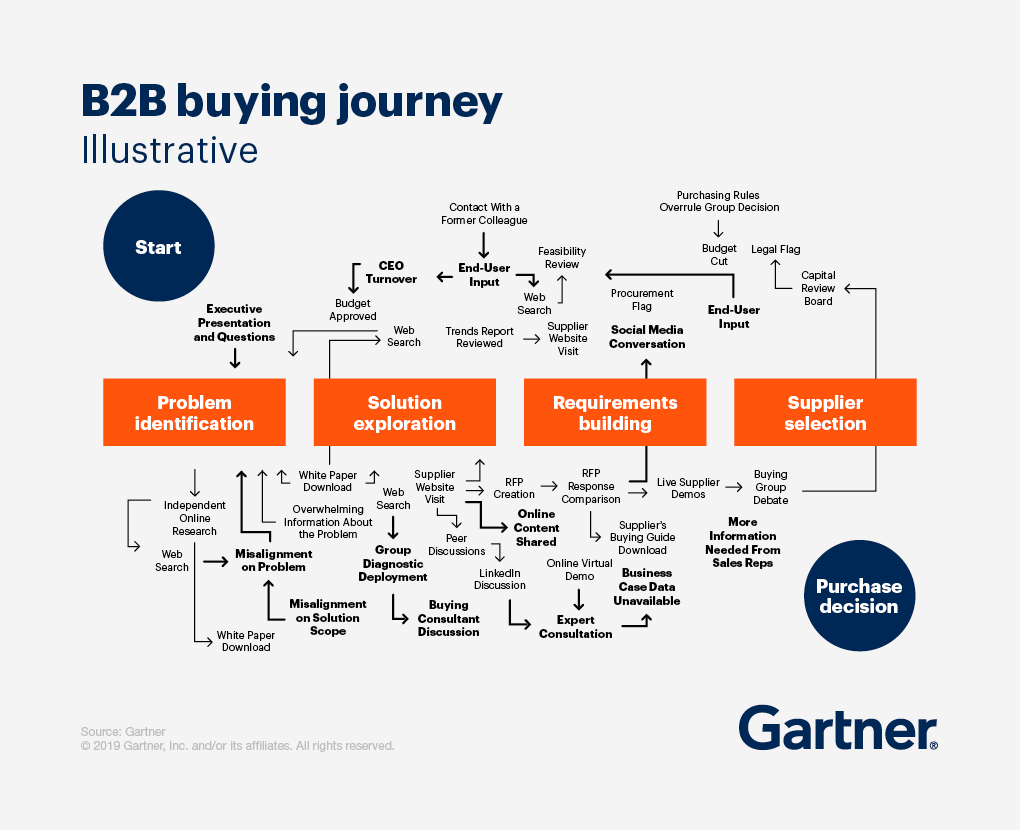Filters
Content Type
Topic
B2B Omnichannel Marketing and Sales: Can They Work Together to Boost Your Lead Conversions?
The B2B landscape has shifted with the emergence of multiple touchpoints and channels. The most successful businesses are now those that can identify and build relationships with the right customers, at the right time, through the right channel. This means that your company’s marketing and sales teams must work together to identify and nurture the best lead prospects — regardless of channel.
Omnichannel marketing is a powerful strategy for converting prospects into customers. But can you combine this strategy with your B2B sales process to get even better results?

Omnichannel Marketing and Sales: What You Need to Know
Omnichannel marketing and sales refer to any marketing or sales strategy that uses multiple communication channels — whether it’s email, social media, voice, or text-based.
B2B companies have been slow to embrace the power of omnichannel marketing and sales. However, studies show that 94% of B2B buyers believe that omnichannel marketing and sales models are “as” or “more” effective than previous marketing and sales models. With the average B2B buyer now interacting with an average of 10 channels during their decision-making journey, B2B companies can no longer afford to ignore the opportunities omnichannel marketing and sales offer.

Source: McKinsey
What is an Omnichannel Sales Strategy
Omnichannel sales strategies help salespeople identify and nurture the best lead prospects regardless of channel. Your sales team can use the same tactics and techniques across multiple channels to generate more leads, prioritize the best leads, and close more sales.
For example, you can use email to nurture a prospect’s interest, send them a link to your sales website to generate the first touch, and then follow up with a call to action to schedule a sales call.
What is an Omnichannel Marketing Strategy
An omnichannel marketing strategy is designed to help your business identify and build relationships with the right customers, at the right time, through the right channel. It’s a strategic plan that focuses on a holistic approach to your marketing, instead of a siloed approach that only focuses on one channel or touchpoint.
Can B2B Omnichannel Marketing and Sales Work Together?
While the two strategies have been discussed and implemented separately for some time now, B2B teams are increasingly using both to effectively reach and convert their target audiences. The result? A more efficient lead generation and sales process that ultimately improves your bottom line. The key is to make sure that your marketing and sales teams are working together to identify and nurture the best prospects – regardless of channel.
5 Steps to Build a B2B Omnichannel Experience that Nets Real Results
A high-quality experience for customers is the holy grail for B2B businesses. But it doesn’t happen through a one-and-done approach. The most successful B2B companies create an omnichannel experience that creates a seamless, consistent customer journey.
Here are five simple steps you can take to create a B2B omnichannel marketing and sales strategy that will help you increase your lead generation, close more sales, and grow your business:
1. Unify Your B2B marketing and Sales Teams
Step one in building an effective B2B omnichannel marketing and sales strategy is to bring together your marketing and sales teams. Marketing and sales are often siloed, which means that your sales team isn’t aware of the marketing programs and marketing teams aren’t aware of the sales programs. A unified team allows teams to work together to identify opportunities to increase sales and marketing leads and then develop a strategy to implement that strategy across all channels.
2. Identify Your Key Accounts
Your B2B marketing and sales strategy should start by identifying your key accounts. These are the most valuable accounts to your business and generate the highest revenue volume. These are the accounts that you should prioritize when developing your B2B omnichannel strategy.
3. Create Engaging Account Journey Maps
The next step in building an effective B2B omnichannel strategy is to create engaging account journey maps for each account. These are often referred to as account maps and are designed to help you identify the best touchpoints and channels to use to build relationships and generate leads for your key accounts.
This is where your marketing and sales teams come together to identify the best ways to build relationships with your accounts. Together, you can create a strategic account map that shows the best touchpoints, channels, and vehicles to use to build awareness, generate interest, and ultimately close sales.

Source: Gartner
4. Personalize the Journey for Each Contact
Your B2B marketing and sales strategy should also focus on providing a personalized experience for each of your key accounts. This means that you should create a series of engaging experiences that allow your customers to get to know your brand, learn about your products, and identify the best solution for their needs.
Whether that’s a call center experience, a live chat experience, or an email series, the goal is to create an experience that helps you build a relationship with your key accounts and ultimately convert them into customers.
5. Track Communications Across Each of Your Channels
Your B2B omnichannel marketing and sales strategy should also focus on tracking the effectiveness of each of your channels. This will help you identify the most successful channels, whether that’s inbound marketing, outbound marketing, social media, or another channel.
Each channel will have a different set of goals. Still, the key is to track the effectiveness of each channel so that you can identify the channels that are performing well and continue to use them to build your B2B omnichannel marketing and sales strategy.
Create an Experience Your Audience Won’t Soon Forget with Hushly
Your B2B marketing and sales strategy are essential for your business. It helps you create an experience that will impress your customers and increase your sales. The key is to bring together your marketing and sales teams to develop a unified strategy designed to identify opportunities and close sales.
When you focus on providing a consistent, personalized experience for each of your key accounts, you’re creating an experience that your audience won’t soon forget.
Hushly can help you build a strategy that draws on the best of what B2B marketing and sales have to offer.
If you’re ready to see what Hushly can do for your brand, then request your personalized demo today!
The post B2B Omnichannel Marketing and Sales: Can They Work Together to Boost Your Lead Conversions? appeared first on Hushly.



